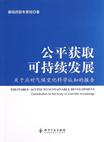公平获取可持续发展
出版时间:2012-9 出版社:知识产权出版社 作者:基础四国专家组 页数:242 字数:244000
Tag标签:无
内容概要
公平获取可持续发展——关于应对气候变化科学认知的报告基础四国专家组著内容提要公平原则是构建未来国际气候制度的基石,只有公平的国际气候制度才能得到各国的接受和执行。“公平获取可持续发展(EASD)”是对公平原则的一种阐释。本书收集了基础四国(BASIC)专家对于“公平获取可持续发展”及其具体执行机制构想的论述,既可为各缔约方制定相关谈判策略提供参考,也可作为相关研究人员的参考书。
Equity principle is the key footstone to construct future
international climate regime. Only the international climate regime
perceived to be equitable can be accepted and implemented by all
Parties. Equity principle can be further expressed as “Equitable
Access to Sustainable Development (EASD)”. This volume collects the
perspectives from BASIC experts on the basic ideas and
implementation frameworks of EASD. Negotiators from different
Parties can refer it to make the negotiation strategies and other
researchers can also use it as a reference.
作者简介
中国:潘家华 张永生印度:T.JayaramanGirish Sant 南非:Harald WinklerThapelo
LeteteAndrew MarquardStefan Raubenheimer 巴西:Adriano Santhiago de
OliveiraJose Domingos Gronzalez Miguez
书籍目录
公平获取可持续发展——基础四国专家联合报告
1.引言
2.公平获取可持续发展
2.1获取大气排放空间
2.2实现发展和获得支持所需的时间
3碳预算和公平分配
4.附件Ⅰ国家的温室气体排放对大气层的过度占用
4.1不可持续的历史与公平、可持续的未来
4.2“谁应承担剩下的责任”的含义
5.两种主要的方法框架
5.1资源分享式的预算方法
5.2减排行动或责任分担方法
6.以各种标准公平分配碳空间
6.1人均标准
6.2历史责任
6.3能力和可持续发展指数
7.比较不同的方法
7.1未来碳预算的比较
7.2资金、技术和发展能力支持中的公平
7.3在确定国家碳预算过程中的南南合作
7.4适应中的公平
8.结论:需要建立一套以公平原则为基础的制度框架
历史排放责任在国际气候制度中的重要性
Jose Domingos Gonzalez Miguez and Adriano Santhiago de
Oliveira
公平获取可持续发展:碳预算账户方案
中国社会科学院、国务院发展研究中心联合项目组
1.引言
2.原则和方法框架
2.1原则
2.2方法框架
2.3特点
244优点
3方法学
3.1为每个国家建立预算账户
3.2参数和数据
4.计算结果
5.分析结果对发达国家向发展中国家提供支持的含义
5.1附件Ⅰ国家的碳预算转移和平衡
5.2资金转移
6讨论
6.1国际合作机制设计
6.2历史责任追溯起点
6.3紧缩趋同
6.4内涵排放问题
6.5人均原则对大的发展中国家意味着什么
7.结论
附录1碳预算账户:间接测量方法
附录2在碳预算账户方案中考虑技术进步和溢出效应
公平获取可持续发展:印度方案
T. Jayaraman, Tejal Kanitkar and Mario Dsouza
1.简介
2.公平获取可持续发展的基本特点
2.1公平性方面
2.2可持续性方面
3公平获取可持续发展的执行机制
3.1主要方案
3.2关于该方案的一些技术细节
4公平获取碳空间与资金以及技术转让
4.1排放权赤字与资金转让
4.2节约的碳成本与固定碳价格的比较
5.结论
责任、能力和可持续发展:南非方案
Harald Winkler, Thapelo Letete and Andrew Marquard
1简介
2分析方法与原则
2.1责任
2.2能力
2.3可持续发展
2.4将这些指数结合起来
3方法学
3.1模型说明
3.2数据来源
3.3基准排放水平预测结果
3.4碳预算和所要求的全球排放路径
3.5对每个国家分配公平的减排责任
3.6计算每个国家的剩余排放空间
4.计算结果
5.分析结果对于发达国家向发展中国家提供支持的意义
后记
Content
Equitable Access to Sustainable Development:Contribution to the
body of scientific knowledgeContentEquitable Access to Sustainable
Development——A Joint Paper by Experts from BASIC Countries
1.Introduction
2.Equitable Access to Sustainable Development
2.1Access to Atmospheric Space
2.2Time for Development and Support
3.Carbon Budgets and Equitable Distribution
4.Overoccupation of the Atmosphere by Annex Ⅰ Countries GHG
Emissions
4.1Unsustainable Past and a Sustainable Future with Equity
4.2Implications for“Who Picks up the Remainder”
5.Two Broad Frameworks
5.1Resource?sharing Budget Approach
5.2Effort / Burden?sharing Approach
6.Operationalising Equitable Distribution of Carbon Space
through
Criteria
6.1Per Capita
6.2Historical Responsibility
6.3Capability and Indicators of Sustainable Development
7.Comparing Approaches
7.1Comparing Future Carbon Budgets
7.2Equity in Support—Finance, Technology and
CapacityDevelopment
7.3South South Cooperation in Determining National Carbon
Budgets
7.4Equity in Adaptation
8.Conclusion: the Need for an Equity based Reference
Framework
The Importance of Historical Responsibility in the Context of the
International Regime on Climate Change
Jose Domingos Gonzalez Miguez and Adriano Santhiago de
Oliveira
Equitable Access to Sustainable Development: Carbon Budget Account
Proposal CASS/DRC Joint Project Team
1.Introduction
2.Principles and Approach
2.1Principles
2.2Approach
2.3Features
2.4Advantages
3.Methodology
3.1The Budget Account for an Individual Country
3.2Parameters and Data
4.Results
5.Implications for Support by Developed Countries for Their
Developing Counterparts
5.1Transfers and Balance of Carbon Budget for Annex Ⅰ
5.2Financial Transfers
6Discussions
6.1Mechanism Design for International Cooperation
6.2The Starting Point of Historical Responsibilities
6.3Contraction and Convergence
6.4The Issue of Embedded Emissions
6.5What does the Per Capita Principle Mean to Large Developing
Countries
7.Conclusion
Appendix 1Carbon Budget Account: An Indirect Measurement
Appendix 2Carbon Budget Account with Consideration of
Technological
Improvement and Spill over EffectsEquitable Access to Sustainable
Development: An Indian Approach
T.Jayaraman, Tejal Kanitkar and Mario Dsouza
1.Introduction
2.Basic Features of Equitable Access to Sustainable
Development
2.1The Equity Dimension
2.2The Sustainability Dimension
3.Operationalising Equitable Access to Sustainable
Development
3.1 The Main Proposal
3.2Some Technical Details of the Proposal
4.Equitable Access and Financial and Technological Transfers
4.1Entitlement Shortfall and Financial Transfers
4.2Cost of Avoided Carbon Compared to Fixed Carbon Prices
5.ConclusionResponsibility, Capability and Sustainable
Development:A South African Approach
Harald Winkler, Thapelo Letete and Andrew Marquard
1.Introduction
2.Approach and Principles
2.1Responsibility
2.2Capability
2.3Sustainable Development
2.4Combining the Indicators
3.Methodology
3.1Model Description
3.2Data Sources
3.3Baseline Emission Projections
3.4Carbon Budget and Required Global Emission Pathway
3.5Allocating a Fair Share of Mitigation Effort for Each
Country
3.6Calculating the Remaining Emission Space for the Country
4.Results
5.Implications for Support by Developed Countries for Developing
Countries
Epilogue
后记
章节摘录
基础四国的部长们深刻地思考了排放空间的物理属性与发展之间的关系并“重申其对全球温升不超过2℃这一意向性目标的支持,铭记经济社会发展及消除贫困是发展中国家的首要的和压倒一切的优先事项。”尽管各界关于温升目标的意见仍未统一,但所有发展中国家都认同实现经济和社会发展以及消除贫困才是它们的首要任务。 基础四国的专家们在2010年和2011年期间曾数次召开会议专门讨论公平问题。在2011年2月的基础四国部长级会议上他们得到授权,“为下次基础四国会议准备一份关于公平获取可持续发展的综合报告”。这份联合报告作为本书的导论部分,对四篇国别报告中所运用的各种方法进行了总结,归纳出这些方案的共同点,同时也保留了分歧部分。以后面四篇文章的内容为基础,本文尝试建立起一套以公平原则为基础的制度框架。 2 公平获取可持续发展 为了避免全球温升幅度提高到令人无法接受的程度,需要将温室气体排放水平控制在防止气候系统受到危险的人为干扰的水平上,这是一个极为重要的全球问题。没有一个国家能单独解决该问题。大部分国家同意签署《公约》,表明该事实已经被全球所广泛认可。 许多全球性问题都无法由某些国家独立解决,主要是因为这些问题在解决过程中无法获得足够的支持,而且难以对全球性的行动进行协调并取得进展——控制全球变暖问题就是一个实例。发展中国家清楚地意识到,在一个无法保证平等的世界里要解决全球性公共物品(特别是大气层)供给不足的问题,需要在各方面不断努力。 ……
图书封面
图书标签Tags
无
评论、评分、阅读与下载
用户评论 (总计1条)
- 中英文双语的
